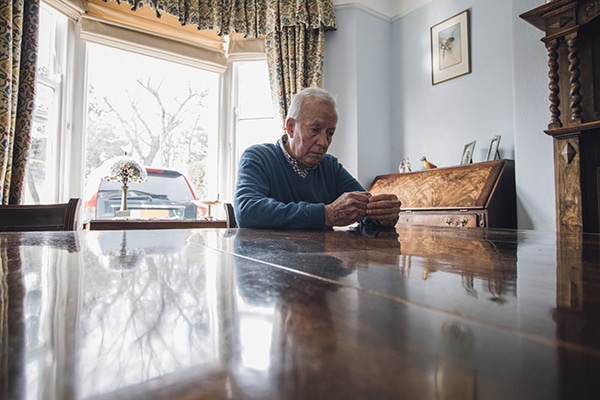
Some of the statistics on loneliness in older people are shocking and not just for those living alone in the community. Being lonely can seriously affect the mental, emotional and physical health of our elderly population and can lead to depression, cardiovascular problems and a compromised immune system. The huge changes and emotional upheaval of moving into a care facility can increase feelings of social isolation, depression and loneliness.
A study by the University of Bedfordshire found eighty percent of older care home residents with mental health problems (including dementia) experienced loneliness with minority groups being higher risk. In care homes, male residents are generally outnumbered by female residents and care staff, leaving them at higher risk of feeling socially isolated in this environment. So how can we start to meet the needs and reduce the loneliness of the men in our care?
I know from experience that it is harder to engage men in meaningful activities, especially social and group activities compared to women. Women tend to have wider social networks, whereas men have often previously relied on others for social contact making them particularly vulnerable to loneliness when their partner dies. Men can be more reluctant to initiate conversations, fearing that people won’t be interested or worrying about becoming a burden.
In group activities men often struggle to engage passively, preferring to be given a role, and to be valued for this. So, a man may be reluctant to join in a game of bingo but would be quite happy to call out the numbers. Activities such as crafts, baking and domestic tasks are aimed predominantly at women, so even if men want to participate, they are disadvantaged unless they can be given a role in the group to build their confidence. A man in a baking group may be happier preparing the baking tins than sitting with the group rolling out pastry. Of course, there are men who are quite happy to do needlework or baking, just as there are women who would enjoy a pint and a game of dominoes.
Work-related activities help men to feel valued and useful or at least it provides a talking point. Those who served in the armed forces may still enjoy shining their shoes every day. Farmworkers, gardeners or skilled tradesmen may like to “help out” around the facility. Perhaps your maintenance guys would allow male residents to watch them painting the walls or changing light bulbs. It helps them to feel part of the “team” even if they are only passing a screwdriver or chatting about the work they used to do.
A men only room (man shed!) or even a dedicated corner of a room can encourage men to socialise with each other. Somewhere they can get together as “comrades”, reminiscing and telling men jokes or watching sports or war films to their hearts content. Provide men’s books and magazines, pictures and board games to stimulate conversation and reminiscence. If you don’t have enough suitable male residents, then maybe think about sharing resources with another care home. A social trip to another care home to watch a film or have a game of boules or skittles could work well with a reciprocal visit the following week.
There is plenty work to be done on addressing loneliness and it’s hard with workloads already stretched and staff under pressure, but it’s worth thinking outside the box. Small things can make a huge contribution towards reducing loneliness and improving the overall health and well being of those we care for.
Useful Links
https://gulbenkian.pt/uk-branch/publication/alone-in-the-crowd-loneliness-and-diversity/
https://www.bristol.ac.uk/news/2019/april/older-men-loneliness.html






